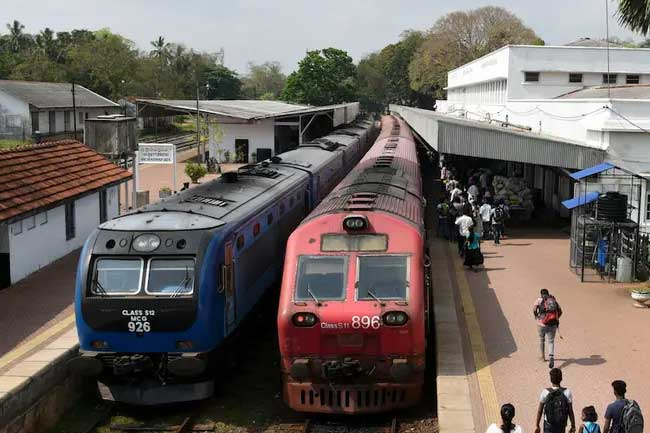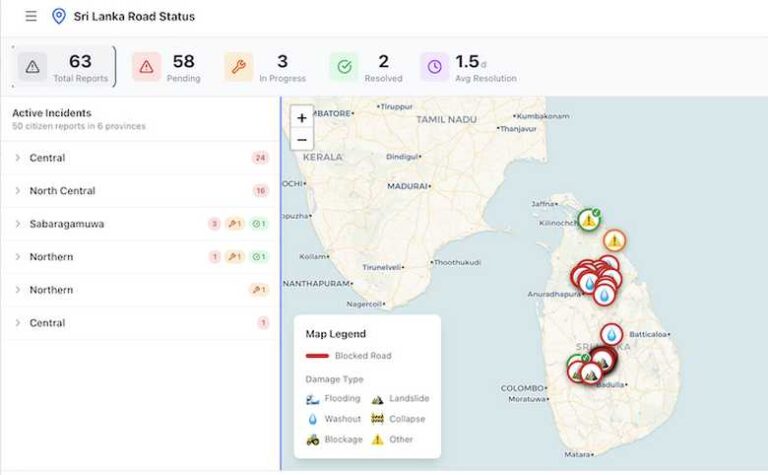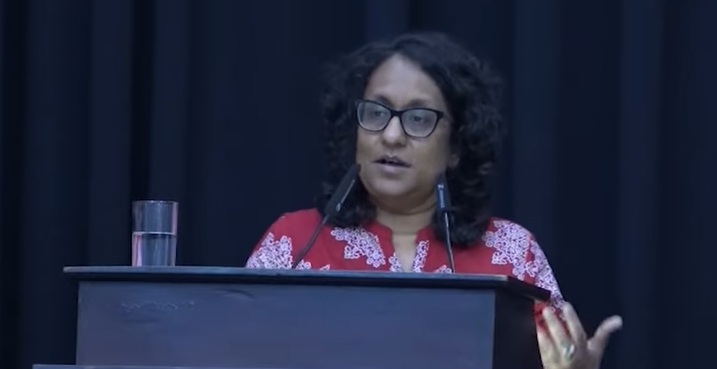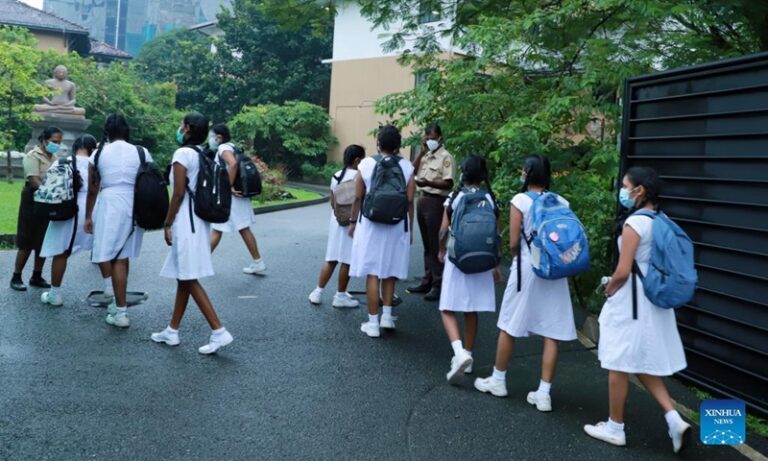December 15, Colombo (LNW): The reconstruction of railway infrastructure damaged by the recent disaster is expected to require an investment of around US$ 400 million, according to Commissioner General of Essential Services Prabhat Chandrakeerthy.
He said the extent of destruction to rail tracks and related facilities means that full restoration will be a lengthy process, with work needing to be carried out in stages across multiple affected areas.
Providing an update on the health sector, Chandrakeerthy noted that close to 90 per cent of the 236 medical institutions impacted by the disaster have already resumed operations. Temporary arrangements have been made for facilities such as Spring Valley and Kandegedara hospitals, which have been relocated to alternate premises.
He added that Mahiyanganaya and Chilaw hospitals, both of which suffered extensive damage, have now returned to normal service delivery. However, the disaster caused serious losses to medical equipment, including high-value items such as CT scanners, which were badly damaged and will take time and significant resources to replace.
Authorities say recovery efforts remain ongoing, with priority being given to restoring essential transport and health services while longer-term reconstruction plans are finalised.
Ditwah Damage: Railway Repairs to Cost About $400 Mn
Police Alert Public to Rise in Phone Scams Impersonating Officials
December 15, Colombo (LNW): Sri Lanka Police have issued a renewed warning to the public over a growing number of fraudulent telephone calls made by organised groups posing as law enforcement officers and bank staff.
According to police, the callers often claim to represent institutions such as the Sri Lanka Police, the Criminal Investigation Department, the Financial Crimes Investigation Division or commercial banks. Their aim, authorities say, is to frighten and pressure victims into complying with false demands.
These callers typically allege that the recipient is linked to serious offences, including financial crimes or money laundering, and threaten imminent arrest or legal action. To make their claims sound convincing, they may refer to partial personal information, such as a name, identity card number or supposed recent transactions.
Police said victims are frequently instructed not to discuss the matter with anyone, including family members, on the excuse that the case is confidential. In more elaborate attempts, scammers may initiate video calls, using staged backgrounds, fake uniforms or mock office settings to reinforce the deception.
The scam usually culminates in a demand for money, either through bank transfers or cash deposits, supposedly for verification, clearance procedures or temporary holding in a “government” account. In some instances, victims are also pressured into revealing sensitive information such as bank account details, PINs, one-time passwords or copies of identity documents.
Police stressed that no legitimate officer or government agency will ever request money or personal banking information over the telephone. They also clarified that official investigations, arrests or court actions are never communicated by phone, but only through formal written notices or legal channels.
Members of the public who receive such calls are advised to hang up immediately and avoid sharing any information. Police recommend verifying any claims independently by contacting the nearest police station or using official contact details published by the Sri Lanka Police, rather than numbers provided by callers.
Those who encounter or fall victim to such scams are urged to lodge a complaint without delay, providing as much information as possible, including phone numbers, messages or recordings, to assist ongoing investigations.
Authorities also reminded the public to be cautious when sharing personal details, noting that basic information can easily be harvested through online forms, registrations or promotional campaigns. Police reiterated that persistent threats and urgent demands for money are clear signs of a scam and called on the public to remain alert.
New Online Portal Empowers Public to Flag Road Issues Nationwide
December 15, Colombo (LNW): The Ministry of Transport, in collaboration with the Road Development Authority and the Ministry’s Digital Task Force, has introduced a new online platform designed to help the public report road-related problems across the country.
Transport Minister Bimal Rathnayake said the website, road-lk.org, was created to fill a long-standing gap in real-time information on road closures, damage, accidents and ongoing repairs. He noted that while navigation apps are widely used, they rarely provide structured or verified updates on road conditions, a challenge faced not only in Sri Lanka but elsewhere as well.
The initiative gained urgency following extensive road damage caused by recent disasters, though the Minister stressed that the system is intended to function as a long-term public service even under normal circumstances.
The platform relies heavily on citizen participation. Road users can submit reports through the site’s reporting portal in Sinhala, Tamil or English, and are encouraged to attach photographs to support their submissions. Once received, reports will be reviewed by RDA officials before being reflected on a national road map. Provincial road development authorities have also been authorised to update information directly.
Rathnayake emphasised that public input will be the backbone of the system, particularly given the country’s large population and extensive road network. He said there are plans to later allow traffic police officers and divisional secretaries to log issues directly, and to gradually expand coverage to include rural roads once the platform is fully established for national and provincial routes.
Currently operating as a pilot project for several weeks, the portal is expected to be formalised thereafter. The Minister urged motorists and commuters to make active use of the system, describing public engagement as essential to keeping the information accurate and up to date.
NMRA Orders Immediate Recall of Ondansetron Batches Over Safety Concerns
December 15, Colombo (LNW): The National Medicines Regulatory Authority (NMRA) has ordered the immediate suspension of four batches of Ondansetron injections, a widely used drug prescribed to control nausea and vomiting in children, expectant mothers and patients undergoing surgical procedures.
In a directive issued on December 12, 2025, the NMRA said the decision was taken following reports of adverse reactions associated with the medicine.
The manufacturer has been instructed to submit a detailed explanation within a period of 28 days, while the affected batches are removed from circulation.
Commenting on the development, Dr Chamal Sanjeewa, Chairman of the Doctors’ Trade Union Alliance for Medical and Civil Rights, reiterated longstanding concerns about medicines approved under the Indian Pharmacopoeia.
He noted that several such products imported in recent years had later been withdrawn due to quality failures, and criticised the Health Ministry for permitting their use in public hospitals without further independent testing. He warned that substandard drugs pose both health risks to patients and financial losses to the state.
Defence Ministry Releases Framework for Distribution of Disaster Relief Funds
December 15, Colombo (LNW): The Ministry of Defence has announced the release of official guidelines to support the implementation of a programme aimed at empowering communities affected by recent disasters.
In a statement, the Ministry confirmed that the framework has been cleared by the Ministry of Finance and Planning, as well as the Ministry of Public Administration, Provincial Councils and Local Government, ensuring consistency across government agencies.
Following these approvals, the Defence Secretary has formally issued the guidelines to District and Divisional Secretaries, who will oversee the allocation and distribution of relief funding at the local level.
The document sets out the roles and responsibilities of institutions involved in the relief process and provides detailed guidance on the types of assistance and financial allowances to be extended to eligible beneficiaries, with the aim of ensuring transparency and effective support for affected communities.
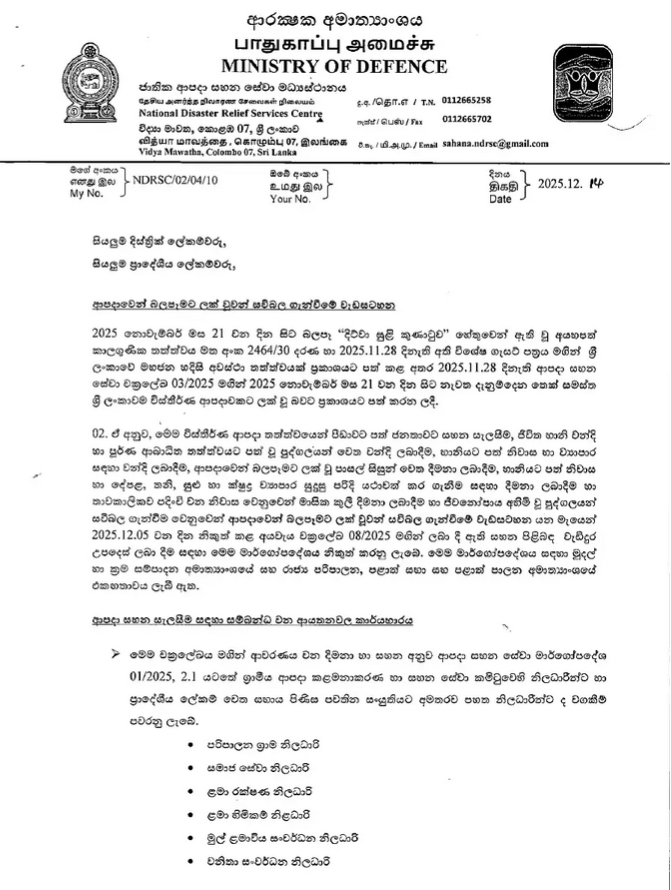
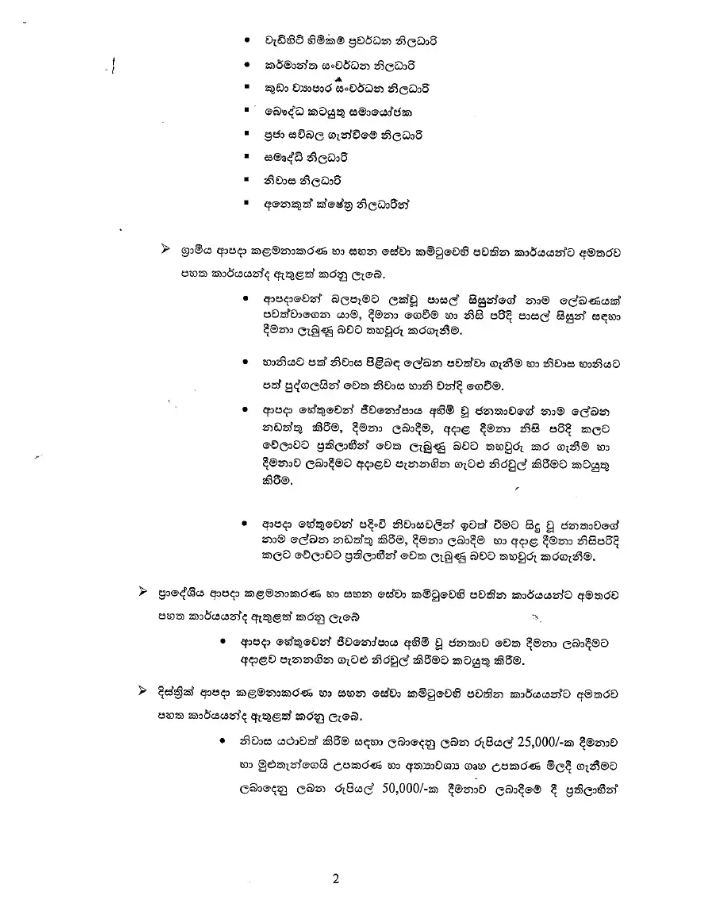
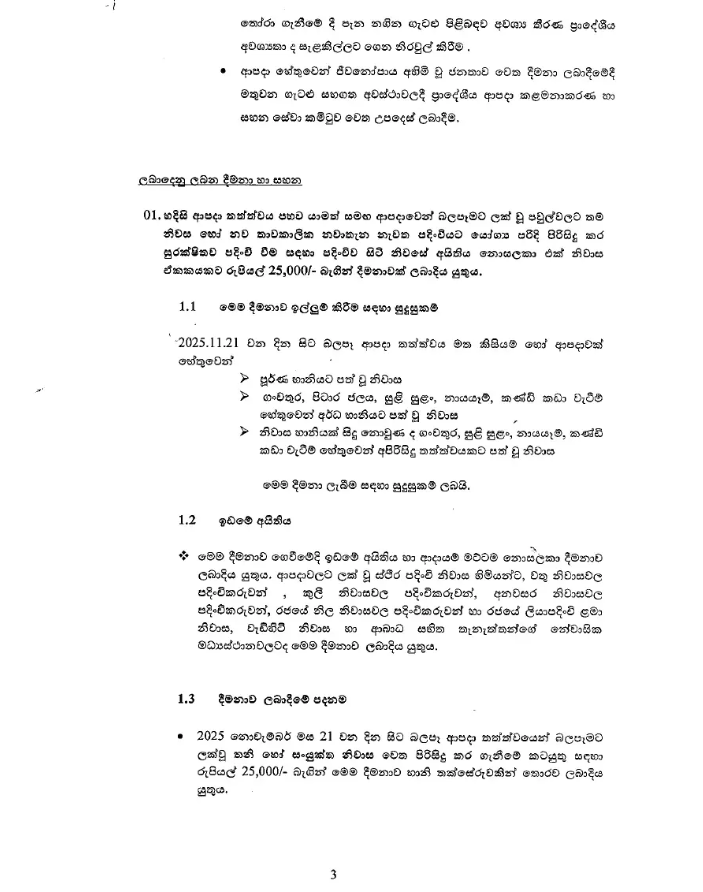
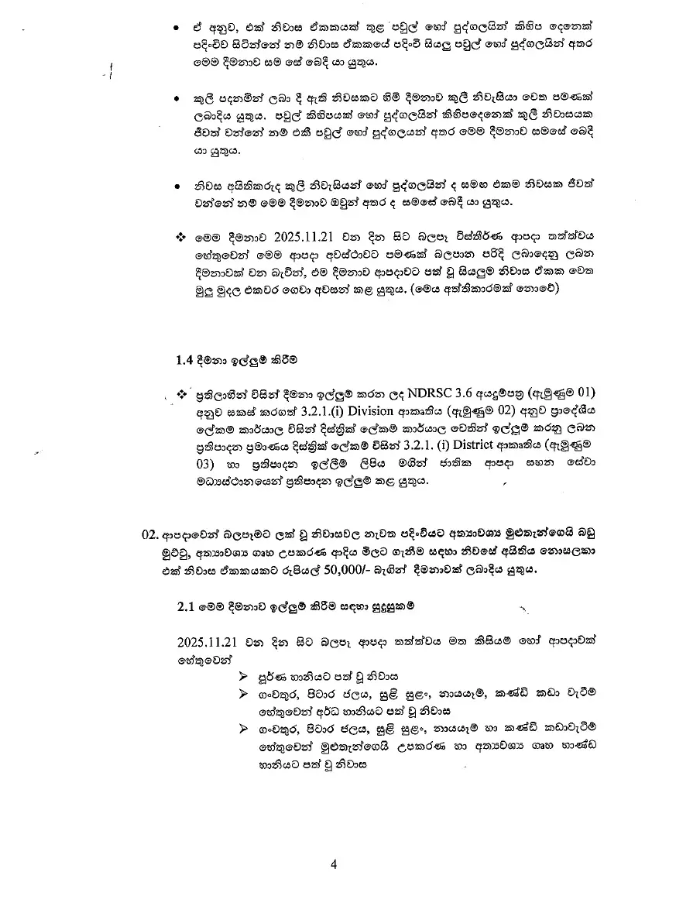
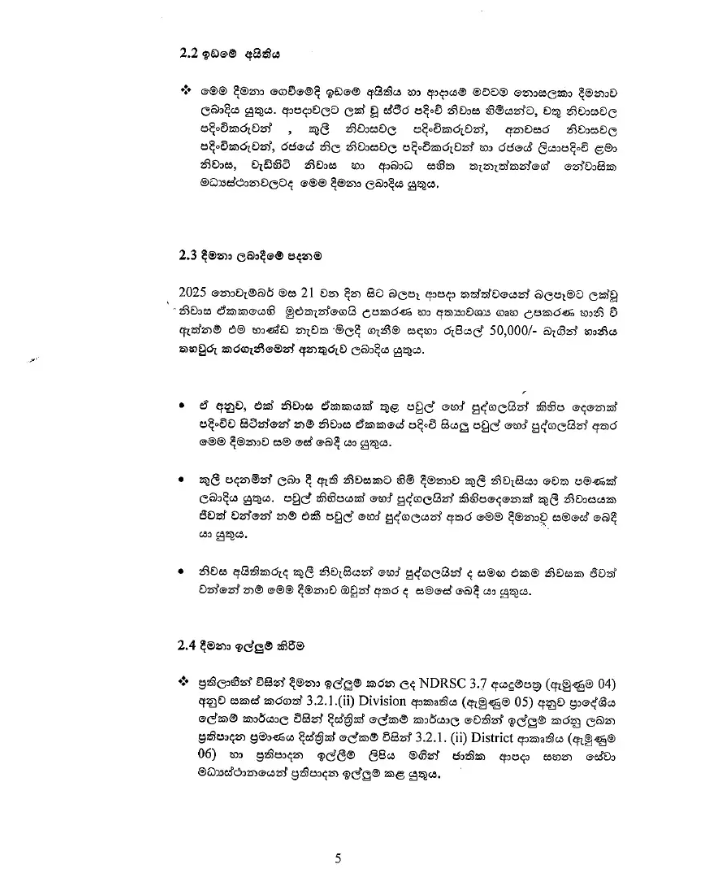
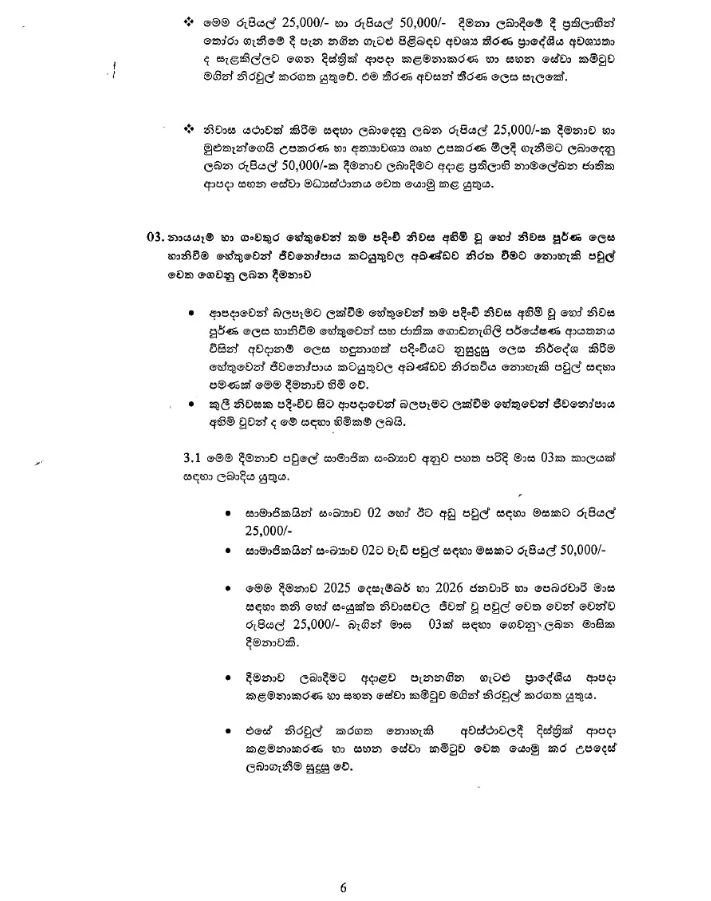
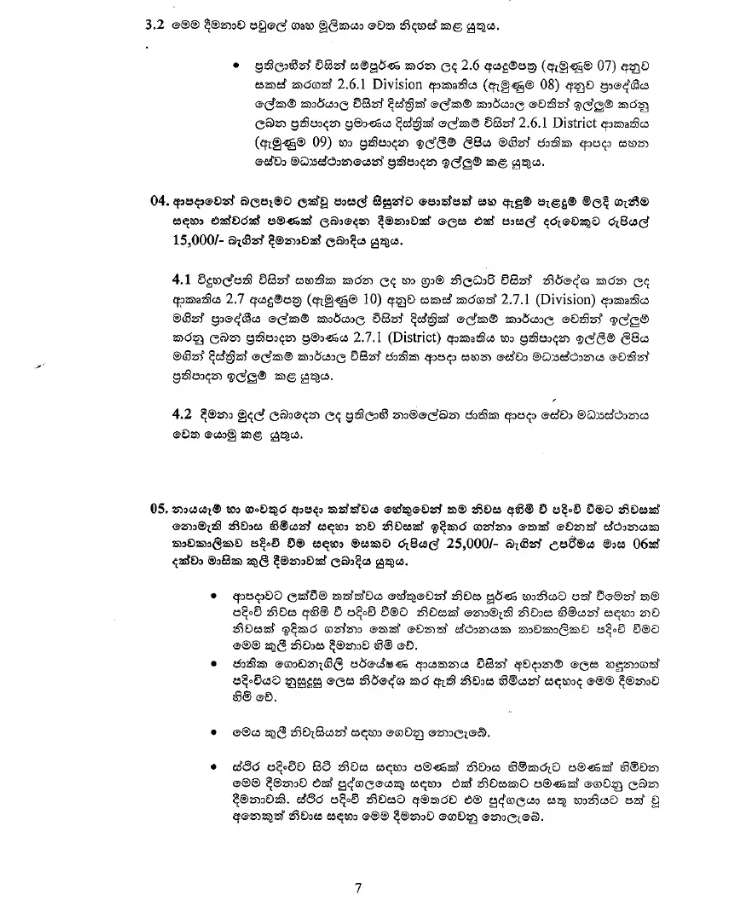
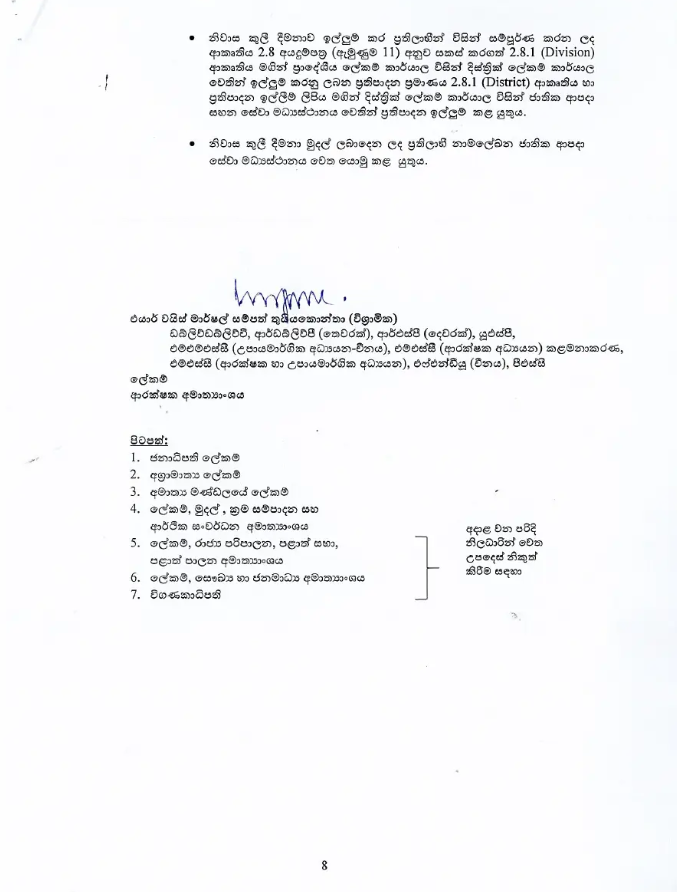
India Extends Medical and Food Assistance to Sri Lanka
December 15, Colombo (LNW): The Government of India has provided a fresh consignment of humanitarian supplies to Sri Lanka, comprising essential medicines and dry food items, as part of ongoing support to the country.
The shipment, which includes 17 types of critical pharmaceuticals along with more than 14,200 kilogrammes of dry rations, was formally handed over at Bandaranaike International Airport. Indian Deputy High Commissioner Dr Satyanjal Pandey presented the supplies to Sri Lanka’s Minister of Health, Nalinda Jayatissa.
Officials said the assistance was arranged in response to a request from the Sri Lankan Health Ministry and is expected to strengthen healthcare services and support vulnerable communities during the current recovery period.
Prime Minister Emphasises Values-Based Education at National Student Recognition Event
December 15, Colombo (LNW): Prime Minister Dr Harini Amarasuriya has said the Government is committed to shaping a generation that is socially responsible, environmentally conscious and deeply rooted in democratic values.
She made these remarks while speaking at a ceremony held at Temple Trees to mark the ninth phase of a nationwide initiative that honours high-achieving GCE Advanced Level students. The programme is conducted through the Presidential Fund and aims to recognise academic excellence across the island.
Addressing the gathering, the Prime Minister described the Presidential Fund as a public trust, noting that the Government is working to ensure it is widely understood and experienced as a fund that genuinely serves the people.
She stressed that investments in education and youth development are central to national progress. The objective, she said, is not only academic success but the cultivation of individuals who show leadership, act with compassion, value collective responsibility and actively protect the environment, while respecting democratic principles.
According to the Prime Minister, building such human capital is essential for the country to move forward with resilience and unity in an increasingly complex world.
Cyclone Ditwah Death Toll Rises to 644: Recovery Efforts Continue
December 15, Colombo (LNW): The number of fatalities associated with Cyclone Ditwah has continued to rise more than two weeks after the storm struck Sri Lanka, according to the latest update issued by the Disaster Management Centre.
The DMC confirmed that 644 deaths have now been linked to the severe weather, while 183 people are still reported missing as search operations and assessments proceed in affected areas.
Kandy District has recorded the highest number of fatalities, with 237 deaths attributed to the cyclone and its aftermath. Nuwara Eliya and Badulla districts have also been heavily impacted, reporting 89 and 88 deaths respectively.
The extreme weather has affected all 25 districts across the country, disrupting the lives of nearly 1.35 million people from more than 385,000 families. At present, over 70,000 individuals representing 22,638 families remain in 766 temporary relief centres.
Housing damage remains extensive, with 6,163 homes completely destroyed and a further 112,171 suffering partial damage. Authorities say relief, resettlement and reconstruction efforts are ongoing, as communities continue to grapple with the long-term consequences of the disaster.
Schools to Reopen Nationwide After Cyclone Disruptions
December 15, Colombo (LNW): Schools closed in the wake of Cyclone Ditwah are set to reopen across the country tomorrow (16), marking a key step towards restoring normalcy in the education sector.
The Ministry of Education has instructed school principals, teaching staff and non-academic employees to report today to carry out essential preparations ahead of the reopening.
However, the Ministry confirmed that 147 schools which sustained severe damage will remain closed until further notice, as repairs and safety assessments continue.
In consideration of families affected by the disaster, authorities have announced a flexible approach to school uniforms for both students and staff in impacted areas. This temporary measure aims to ease the burden on households still recovering from losses.
To support students returning to school, the Sri Lanka Transport Board has extended travel concessions, allowing schoolchildren to use their November season tickets throughout the current month. Deputy Minister of Transport and Highways Prasanna Gunasena said the facility can be accessed by simply presenting the previous month’s ticket.
In a show of solidarity, Deputy Minister of Labour Mahinda Jayasinghe revealed that teachers have agreed to contribute one day’s salary in January to a fund dedicated to restoring education facilities and resuming disrupted academic activities.
Showery conditions influenced by easterly wave expected to enhance (Dec 15)
December 15, Colombo (LNW): Under the influence of an Easterly wave, showery conditions are expected to enhance to some extent over the island from tomorrow (16), the Department of Meteorology said today (15).
Several spells of showers will occur in Northern, North-Central, Eastern, Uva and Central provinces.
Showers or thundershowers may occur at several places in the other areas of the island after 1.00 p.m.
Fairly strong winds of about (30-40) kmph can be expected at times over Eastern slopes of the central hills, Northern, North-central and North-western provinces and in Trincomalee, Hambantota and Monaragala districts.
Misty conditions can be expected at some places in Sabaragamuwa, Central provinces and in Galle and Matara districts during the early hours of the morning.
The general public is kindly requested to take adequate precautions to minimise damages caused by temporary localised strong winds and lightning during thundershowers.
Marine Weather:
Condition of Rain:
Showers will occur at several places in the sea areas off the coast extending from Kankasanthurai to Pottuvil via Trincomalee. Showers or thundershowers may occur at a few places in the other sea areas around the island during the evening or night.
Winds:
Winds will be north-easterly. Wind speed will be (30-40) kmph. Wind speed can increase up to (50-55) kmph at times in the sea areas off the coast extending from Kaluthara to Trincomalee via Puttalam and Kankasanthurai and from Hambantota to Pottuvil.
State of Sea:
The sea areas off the coast extending from Kalutara to Trincomalee via Puttalam and Kankasanthurai and from Hambantota to Pottuvil will be rough at times. The other sea areas around the island will be moderate.
Temporarily strong gusty winds and very rough seas can be expected during thundershowers.

